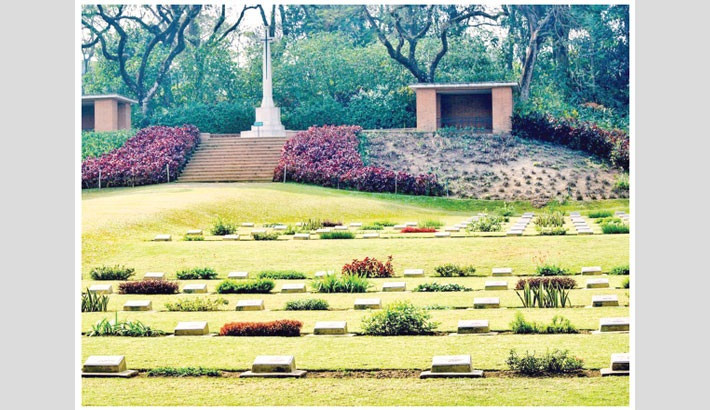
The Maynamati War Cemetery in Cumilla district accommodates 702 graves of soldiers who lost their lives during World War II while fighting for the Allied Powers. The soldiers buried there include nationalities from Australia, Britain, Canada and New Zealand. Among them, 172 soldiers were military personnel from the Indian subcontinent (which was then British India). Interestingly, the majority of the 172 British Indian casualties—around 120—were Muslims. At that time, Muslims were generally believed to hold stronger anti-British sentiments, as they had lost their political power to the British and, in general, suffered economic hardship and discrimination under British rule.
The British Indians were mostly from present-day Pakistan and western India. Consider the case of 17-year-old Samand Ali from Kohat, Pakistan, or 19-year-old Mehar Din from Amritsar, India. The parents and relatives of these teenagers could not even take their children’s dead bodies home to bury them or mourn. There were also the sons of our soil— 22-year-old Fazl Kabir and 33-year-old Abdul Rahman from Chattogram; 20-year-old Dalil-Ur-Rahman, 24-year-old Abdul Haq and 26-year-old Abdul Khalik from Noakhali, and 26-year-old Abdul Matlub from Barishal. They were not conscripted; they volunteered for military service. Perhaps they joined the war driven by youthful emotions, believing that they were doing the right thing or supporting, in their judgment, a right cause.
The sons of our soil fought another war in 1971— the War of Liberation— against the Pakistan military regime. And, in July-August 2024, they stood up once again for a cause they believed was worth sacrificing their lives for. They staged a mass uprising against the fascist regime of Sheikh Hasina and brought it down. The youth always raise unreserved voices against wrongdoings, injustice, and oppression. They form the frontline in the fight against the wrong and strive to establish the right. They sacrifice their lives and society at large enjoys the benefits of their sacrifice. Therefore, it is our moral obligation to remember them, acknowledge our debt to them, and try to repay it.
In the July-August 2024 mass uprising, thousands were killed and injured—mostly young students. Those who died sacrificed their lives, while those who got injured sacrificed their futures. How long shall we remember them? Our memory will inevitably fade with time. The everyday toiling at work, the hassles of commuting, attending to daily chores, and many other engagements typical for being alive, will never leave enough time for us to remember the fallen heroes or to miss them. How will we repay their debts?
We cannot give anything to those who have sacrificed their lives, but we have the opportunity to support their families and stand beside those who were injured. Unfortunately, we may not be doing enough. In this digital age, when cameras and smartphones are everywhere, and people and institutions are connected by social media, we have not yet been able to comprehensively and convincingly enumerate the number of dead and injured ones in the uprising.
Many of the injured remain in hospitals, and there is growing resentment over the lack of proper treatment, attention, and care. It has scarcely been two months since these heroes ousted a corrupt and brutal regime, yet it seems their existence is already fading away from our thoughts and actions. History tells us that the beneficiaries of their sacrifice will not be the common people but the leaders.
In this country, leaders travel abroad for medical treatments and routine check-ups—of course, at public expense. They do not feel ashamed that this implies they did not care to develop adequate healthcare facilities at home. Do they have the moral right to enjoy disproportionately higher benefits and privileges than the ordinary people they are supposed to serve?
The injured students and other individuals must be sent abroad immediately if they require treatment that is not available in this country. Those who have become blind or disabled, unable to work or move without assistance, must be provided with adequate means so that they may live a respectable life. A special fund, open to contributions from the public should be set up to support them throughout their lives.
On 17 September, such an initiative was launched. The “July Shaheed Smriti Foundation” was formed, with Dr. Muhammad Younus as the President, to provide long-term support to the families of martyrs and injured as one of its objectives. With over 25,000 such families, the fund requirement is huge and continuous.
We are seeing reports in the media about how the members of the ousted regime accumulated astounding amounts of wealth through corruption. Nikkei Asia published a report on 12 September 2024 in which it was said that an estimated $100 billion was laundered out of the country in the past 15 years under the Awami League regime. The report also mentioned that Bangladesh is seeking help from the FBI and the United Nations Office on Drug and Crime (UNODC) to recover these funds. Once recovered, a substantial portion of this money should be allocated to the “July Shaheed Smriti Foundation”.
________________________________________
The writer is a former corporate professional and academic

